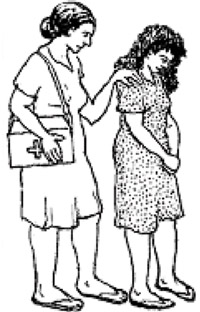Important messages for women after a spontaneous or induced abortion
Giving emotional support

When a pregnancy ends early, a woman may feel afraid, sad or upset, or she may feel guilty or ashamed. Many women, especially unmarried women, feel they must hide a miscarriage or induced abortion because of attitudes against sex, family planning or abortion in their communities. As the closest and most trusted health professional locally, you have an important role to play in sympathising for the loss of the pregnancy and providing the woman with emotional support.
If she had a spontaneous abortion, tell her that this mostly occurs because of maternal illness or problems with the developing fetus. Reassure her that the chances for a subsequent successful pregnancy are good, unless there has been infection of the uterus, or the cause of her miscarriage has not been identified and it has an effect on future pregnancies (but this is rare). If the woman wants another baby, encourage her to delay the next pregnancy until she has completely recovered from the miscarriage or abortion.
Breaking the cycle of unwanted pregnancies
Another important role is providing a family planning service to those who need it, including breaking the cycle of unwanted pregnancies and induced abortions. If pregnancy is not desired after an abortion and there are no severe complications requiring further treatment, the woman should receive adequate counselling and help in selecting the most appropriate contraceptive method that can be started immediately.
Care after an uncomplicated abortion
After an uncomplicated spontaneous or induced abortion, tell the woman that she should expect to feel mild pains or cramps in her lower abdomen for a few days, and some light bleeding from her vagina — no more than in a normal menstrual period. Tell her how she and her family can look after her for a few days.
Taking care after an uncomplicated abortion
Good care after a spontaneous or induced abortion can prevent infection and help a woman's body to heal faster. She should:
- Drink plenty of liquids and eat nutritious foods
- Rest often and avoid heavy work for a week
- Wash regularly, but she should not douche or sit in a bath or tub of water until a few days after the bleeding stops
- Use clean cloths or pads to catch any blood, and change the pads often
- Not put anything inside her vagina, and avoid sexual intercourse for at least a few days after the bleeding stops.
Tell her to call you immediately or seek help from a higher health facility if she has any of the warning signs listed in the next section.